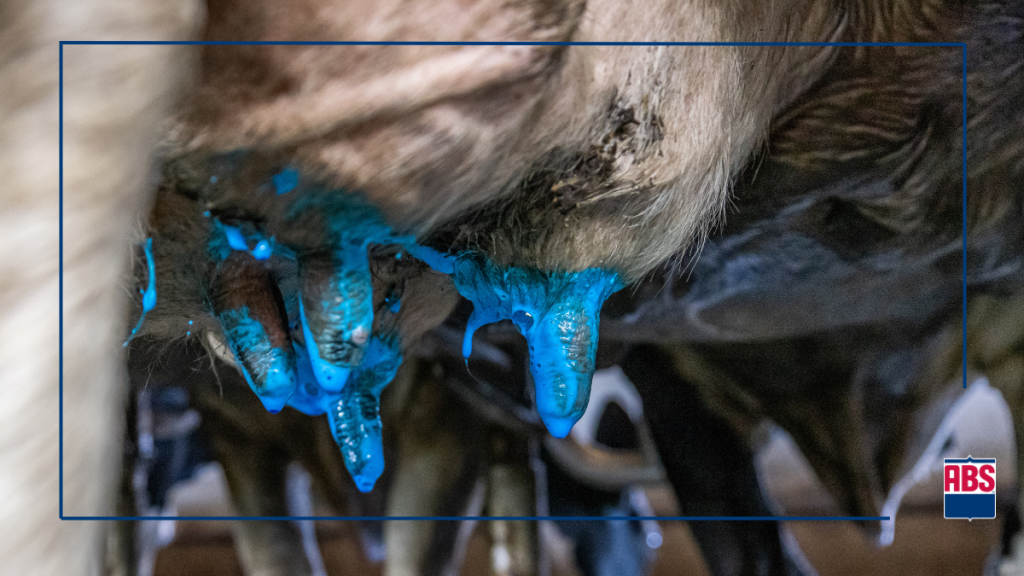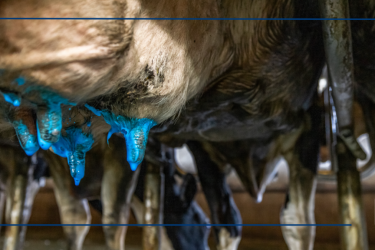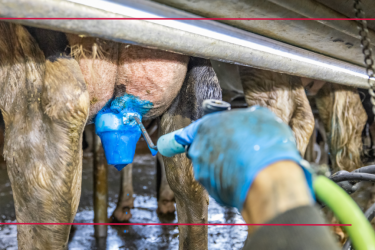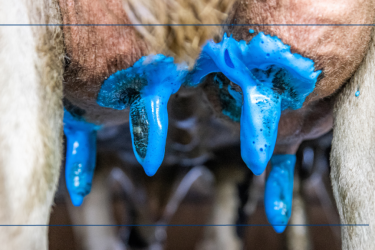Publish date: 12.9.24
No winter teat scaries here, or at least that should be the goal, right?
Winter has hit several parts of the U.S. and is coming to the rest soon. Now is the time to consider if you are using the right udder health program to keep your cows happy and healthy through the winter months. Don’t wait until you start experiencing milk production issues or have an increased number of cows in the hospital pen.
Let’s take a second to think about how cold weather impacts our skin. We can experience dry, cracked, and irritated skin around our nose, mouth, or hands. Our skin is our best barrier to pathogens and other harmful things; thus, dry, cracked, and irritated skin increases your risk of contracting something. The same goes for a dairy cow’s teats. As teats become dry, cracked, and irritated, a cow becomes more susceptible to diseases like mastitis—one of the most expensive dairy health problems. This blog explains why and how to prepare your cows for the cold winter months.
Unhealthy and unconditioned teats put you at risk for increased mastitis cases, lower production, and more milking inefficiencies.
Teat Physiology Changes During Cold Weather
Teat ends can be significantly impacted by the change from summer weather to cool, windy, and rainy conditions. Knowing the physiology of the teat gives you the chance to maintain udder health by protecting the teat skin and ends with the right environment design and conditioning products.
Teat skin is very vulnerable to climate change because it lacks sweat glands, oil glands, and hair follicles. Because of the lack of hair follicles, teat ends are exposed to low temperatures and wind, which can lead to chapping. Frequent contact with disinfectants removes the natural skin oils, which can leave the teat skin dry and prone to chapping even with the use of a high-quality pre-dip.
Overdrying is common as the season changes and when moisture levels in the air are low. The skin’s outermost layer rapidly loses moisture, making it more vulnerable to air movement. Research shows that dry, chapped, or cracked teat skin encourages bacterial development and irritation, potentially increasing the risk of mastitis. It is critical to prioritize udder health going into winter to maintain milk production and quality.
Steps to Take to Prepare for Winter
We suggest not cutting any corners when summer ends, because what you believe you are saving might cost you more during winter. As learned above, changes in moisture levels or cooler wind temperatures can cause a build-up of dead skin on a cow’s teat ends which can lead to problems. The closer you can start with smooth skin, the better an udder health program will work through the winter. Skipping on skin conditioners or components that exfoliate can make teat ends less pliable and ready when winter weather presents. Consider taking these steps to encourage udder health that is prepared for winter.
- Precondition teats by increasing post-dip skin conditioners.
- Exfoliate teat skin by using a post-dip with a component like Lactic Acid.
- Develop a winter teat dip plan designed for your herd and facility.
- Review milking procedures to maintain healthy teats and harvest quality milk completely.
- Ensure milking equipment is within NMC standards.
- Prepare housing to provide an optimal environment that fosters good udder health.
- Look for opportunities to optimizing systems to ensure consistency and efficiency.
ABS UdderCare Products for Winter Months
Our Valiant line of products offers a Triple Threat Protection germicide consisting of advanced chlorine dioxide technology, Linear Alkylbenzene Sulfonic Acid (LAS) for a persistent 12-hour kill, and Lactic Acid which acts as the activator, exfoliates dry skin, and rejuvenates the teat skin. A successful udder care protocol uses the right product for the right situation to ensure maximum effectiveness.
When conditions are tough, we recommend using non-concentrate products, like our Valiant products. See below for a basic winter teat dip protocol, but we recommend working with UdderCare Specialist to design a program specifically for your operation.
- Use Valiant Pre as a pre-dip to clean teats better and perform under wet conditions and heavy soil loads.
- Use Valiant Pre Post as a pre-and post-dip as advised to address environmental challenges and fix teat skin and teat end condition because it is formulated with Lactic Acid to exfoliate dry and dead skin, a 12% skin conditioning package that aids in fixing teat health fast, and a secondary germicide, LAS, to give protection until the next milking.
- Use Artec Winter Dip as a post-dip for extremely cold conditions as it assists in preventing freezing with its 78% skin conditioning system of propylene glycol, glycerin, and lanolin and 1.5% Heptanoic Acid that provides efficacy without the drying effect.
You Get More Than Just Products with ABS
Our products are not the only thing that sets us apart. It is our people. It is our value-added services. We begin by understanding your dairy before a product is ever used. Knowing your dairy allows us to recommend the right products at the right time and continuously monitor product usage to ensure maximum protection.
Our ABS UdderCare Specialists can conduct audits of your milking equipment to ensure everything is running smoothly and efficiently milking out the cows to ensure proper udder health. Also, our team can help you prep your facility housing to provide the best possible environment to promote proper udder health. Finally, we can assist you in designing the right teat-dip program for your operation to keep your cows’ udders and teats healthy.
To build a proper winter teat-dip program and avoid the winter teat scaries, contact your ABS UdderCare Specialist or complete the form below.



